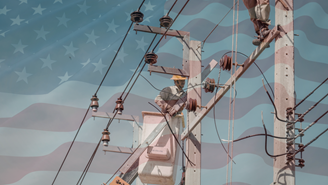Telecommunications services have had a remarkable evolution. Initially offering mostly wired voice services, the industry has become an integral component of the world economy, providing the critical infrastructure upon which other sectors depend. Companies across all sectors rely on telecom services to support their operations and communications needs, which include voice services, internet connectivity, video teleconferencing, and mobile payments. These services allowed companies to pivot quickly to a remote workforce during the pandemic. Telecom customers also rely on these services for their day-to-day needs.
How ESG Risks can factor into investment decisions
The telecom industry is exposed to several Material ESG Issues (MEIs), including Data Privacy and Security, Business Ethics, Human Capital and Product Governance. Product Governance issues in the telecom industry include service quality, maintaining reliable, high-speed networks, and responding to customer billing concerns. The industry is heavily regulated by government bodies which can investigate and enforce penalties for providing poor quality service and publicly report on registered customer complaints. Unreliable service has the potential to financially impact a company, particularly if a customer is unable to reach emergency personnel (fire, medical, police) due to network outages, where widespread outages may result in government investigations and fines.
The impact of widespread outages
The critical role of reliable telecom networks is often not fully appreciated until widespread outages recently occurred in Japan and Canada. On July 2, 2022, KDDI Corp (KDDI), Japan’s second-largest mobile carrier by subscribers, experienced a network disruption lasting over 60 hours, impacting over 30 million mobile customers.1 Users could not make calls, including emergency numbers, or use data services during this time. Platforms that use KDDI’s network, such as weather services, parcel deliveries, ATMs and network-connected cars, were also impacted.2 Less than a week later, Rogers Communications (Rogers), one of Canada’s largest telcos, experienced a nationwide outage leaving customers without phone and internet access for approximately 17 hours;3 some were without service for days following the disruption.4 As of December 31, 2021, Rogers had approximately 11.3 million wireless subscribers, representing around 31% of the subscriber and revenue share of Canada’s wireless market.5 This outage impacted essential services across numerous sectors, including banking, healthcare, transportation, and government. The outage even led to the cancellation of major events across Canada. Businesses that rely on Rogers’ services in their operations and depend on debit transactions were also disrupted, leading to losses in productivity and sales.
The outages were caused by regular maintenance updates in both instances.1,2 KDDI and Rogers have apologized for the network outages and committed to compensating affected customers. Rogers estimates that this refund will amount to approximately CAD 150 million.3 Additionally, a class action lawsuit has been filed against Rogers, pending authorization by a judge, seeking damages for customers who were affected by the most recent outage.4 Rogers CEO, Tony Staffieri, has said the company will separate wireless and internet services to ensure customers will not experience outages for both at the same time. He also mentioned the company will focus on reliability and invest CAD 10 billion (USD 13.11 billion) over the next three years.5
Telecommunications under regulatory scrutiny
Both companies are facing scrutiny for customers losing the ability to call emergency numbers during the network outage.1,2 Japan’s Internal Affairs and Communications Minister Yasushi Kaneko emphasized the importance of people being able to make emergency calls as pandemic risks endure, instances of heat stroke are increasing, and a typhoon is approaching.3
In 2020, the US Federal Communication Commission (FCC) reached a settlement with four companies, including Verizon Communication and AT&T, for a combined payment of over USD 6 million over outages that led to failed 911 calls.6 According to the FCC, phone companies must prevent outages and notify 911 call centers promptly and appropriately when they occur.
Regulators in Canada and Japan are in discussions with telecoms to increase the reliability of their networks. On August 2, 2022, Japan’s Minister for Internal Affairs and Communications issued an administrative order to KDDI demanding the company do more to prevent future outages. According to Japan Today, the minister is planning to launch discussions in autumn 2022 regarding the implementation of roaming services, allowing users to jump onto another carrier’s mobile connection in an emergency.1 A similar action is ongoing in Canada, with Staffieri mentioning that Rogers is working on an agreement with competitors “to switch 911 calls to each other’s network automatically, even in the event of an outage on any carrier’s network.”2
On July 11, 2022, the Canadian Minister of Innovation, Science and Industry, François-Philippe Champagne, ordered telcos to produce a clear resiliency plan in 60 days. This agreement centers on emergency roaming, mutual assistance during outages and improved communication to better inform the public and authorities during telecommunications emergencies.1 The outage has intensified scrutiny of the country’s telecom industry and critiques the Canadian Radio-television and Telecommunications Commission’s regulatory role. Media sources have emphasized that Rogers’ outage should not be viewed as an exceptional one-off that needs to be addressed.2
These incidents emphasize the importance of network reliability and resiliency, given their role as critical infrastructure and supporting the development of new technologies such as 5G and the internet of things. Following these incidents, governments and regulators are looking to impose additional measures and regulations to ensure the resiliency of this critical infrastructure.
Get in touch to learn more about material ESG issues and controversy research, two components of Morningstar Sustainalytics’ ESG Risk Ratings that can affect a company’s score.
Sources:
1. https://about.rogers.com/news-ideas/a-message-from-rogers-president-and-ceo/
2. https://www.kddi.com/english/important-news/20220729_01/
3. https://about.rogers.com/news-ideas/rogers-communications-reports-second-quarter-2022-results/
4. https://montreal.ctvnews.ca/rogers-class-action-lawsuit-filed-in-court-after-network-outage-1.5982900
5. https://about.rogers.com/news-ideas/a-message-from-rogers-president-and-ceo-2/
6. https://www.telecompetitor.com/lumen-to-pay-3-8-million-for-911-outages-att-verizon-also-on-the-hook/
a7ea5578-d27c-4f11-ae32-4294698b6d79.png?sfvrsn=558212d8_2)




